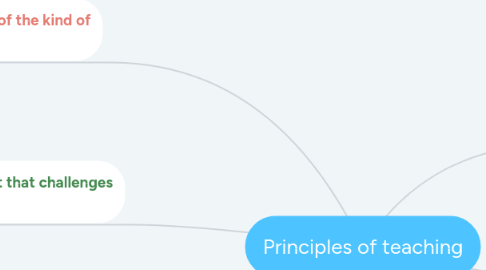Principles of teaching
by Shalisa Page


1. Teach in terms of the kind of knowledge
1.1. Physical, logic-mathematical, and arbitrary knowledge
1.2. Instead of correcting the children, provide examples or experiments for them to find out themselves.
2. Choose content that challenges children
2.1. Focus experiences on big ideas that allow in-depth study
2.2. Provide activities and materials appropriate to a wide range of developmental levels
2.2.1. Some children may have disabilities, some may not. You want to have materials for all children to use
2.3. Analyze activities in terms of regularities and relationships children can construct
2.3.1. Activities should allow children to construct more complex relationships and go beyond regularities
3. Promote children's reasoning
3.1. To find out what the child honestly thinks
3.2. To provide counterexamples and promote disequilibrium
3.2.1. "Teachers should select materials that make the child become conscious of a problem and look for the solution himself."
3.3. To obtain needed information
3.3.1. Ask the children for information instead of telling them everything
3.4. To inspire children's purposes
3.5. To focus children's thinking
3.6. To enrich children's efforts with suggestions
3.7. To model a higher level of reasoning
4. Link Ongoing documentation and assessment with curriculum activities
4.1. Assess and document everything and use that to help teach your children
5. Three key words
5.1. Interest
5.1.1. Experimentation
5.1.1.1. Cooperation
6. Create a cooperative sociomoral atmosphere
6.1. Interpersonal relations in the classroom
7. Appeal to children's interest
7.1. Observe what children do spontaneously
7.2. Propose enticing activities
7.2.1. Putting.materials out and giving children ideas then observing what they do
7.3. Solicit children ideas about what they want to learn
7.3.1. Respect what the children's ideas are and help them find ways to learn more about them
